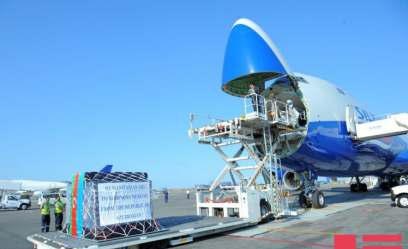Azerbaijan, UAE send humanitarian aid for Rohingya Muslims
BAKU: Azerbaijan and the UAE have sent humanitarian aid to thousands of Rohingya Muslims who have fled to Bangladesh from Myanmar in recent weeks to escape death and torture from the military.
More than 500,000 are now trapped in the impoverished country of Bangladesh without food and shelter. Many are facing near death from starvation and diseases emanating from their dire situation.
The oil-rich Azerbaijan was among the first countries to send in help to the Rohingyas with the government sending 100 tons of humanitarian aid via Silkway West Airlines.
In a joint statement, the Azerbaijan Ministry of Foreign Affairs and Ministry of Emergency Situations said President ilham Aliyev ordered the relief goods to be sent to the Rohingya Muslims.
It includes 20 tons of sugar, 10,000 liters each of corn and sunflower oil, 10,000 tons of condensed milk, 10,000 tons of canned beef, 10 tons of pasta, 10 tons of vermicelli and 20 tons of flour.
In Dubai, Vice President, Prime Minister and Ruler of Dubai, His Highness Sheikh Mohammed bin Rashid Al Maktoum, ordered an air flight to carry UNHCR’s emergency aid to the refugee camp of Rohingyas in Bangladesh.
T he United Nations High Commissioner for Refugees reported
the cargo aid safely which carries 1,671 family tents worth about AED2.7 million arrived in Bangladesh and were distributed to provide shelter to some 8,355 refugees.
In a statement, the UNHCR’s Head of Office in the UAE, Toby Harward, praised the humanitarian response of Sheikh Mohammed bin Rashid, adding, “We are very grateful to His Highness for his generous support. The UAE, and the facilities at IHC in Dubai, is a critical logistical hub that allows UNHCR to respond rapidly in times of emergency. T h e country’s leadership has repeatedly responded benevolently to the many humanitarian challenges that we face today.”
The UNHCR global stockpile in the UAE is the largest global warehouse in the world, and was established in late 2006 as part of the International Humanitarian City, IHC.
Rohingyas continue to flee violence in Myanmar overwhelming the capacity of Bangladeshi refugee camps in Kutupalong and Nayapara.
Tens of thousands of Rohingyas walked through jungles and mountains for days, others in risky voyages through the Bay of Bengal, to escape Myanmar military crackdown against them.
Hundreds have died with some women complaining they were raped by soldiers and their husbands forcibly taken away and killed.


